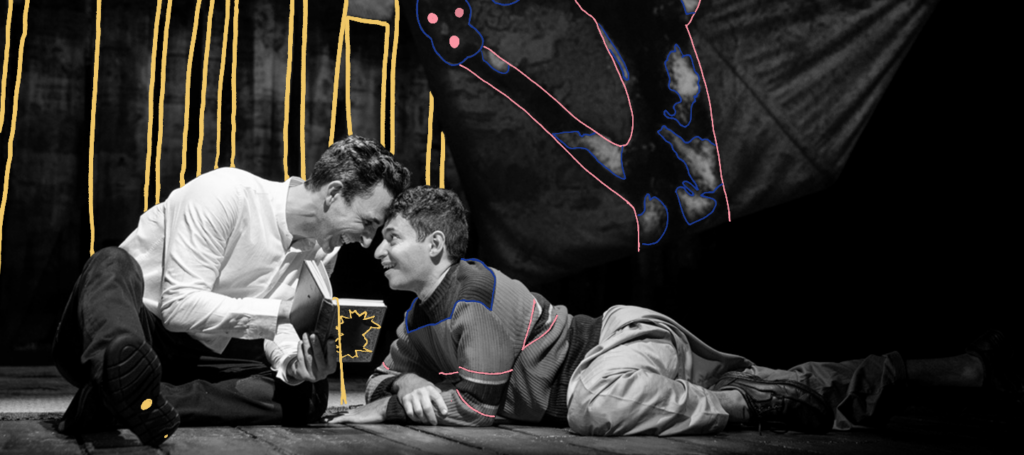


Rushed Storytelling Robs ‘The Kite Runner’ of Its Emotional Impact
A good story is something you enjoy. A great story stays with you and echoes through the ages. Khaled Hosseini’s semi-autobiographical novel The Kite Runner is certainly a great story. Spanning across decades and continents, its labyrinth of interwoven threads tugs at your heartstrings with every twist.
Matthew Spangler’s stage adaptation of Hosseini’s eponymous novel does an adequate job of preserving a lot of the book’s magic as it follows Amir’s (portrayed with nuance by Amir Arison) passage from Kabul, Afghanistan to San Francisco, USA, and back, as the story digs deep into his joy and sorrow.
We first meet Amir (Arison plays him throughout) as a privileged child due to his racial and religious background (Pashtun Suni Muslim) who enjoyed life with relative ease, while his best friend, (though namely servant) the infinitely loyal Hassan (Eric Sirakian commands attention in this defining role as a wide-eyed yet defiant child), a Hazara (Shi’a Muslim), had to endure abuse from both bullies and socio-political pressure.
In the winter of 1975, a kite flying tournament becomes a life-changing moment for both boys, when Amir has to make a choice to either stand up for Hassan who’s been targeted by the bullies, and share his fate, or flee as Hassan suffers alone. Amir’s cowardice ultimately destroys this friendship as the secret festers and he finds himself plotting to drive Hassan out of his life completely.
Years later, Amir has finally reshaped his life and identity in San Francisco, after his Baba (Faran Tahir) decided to leave Afghanistan in the 80s due to political unrest, when ghosts from his past haunt him once again in the form of Sohrab, Hassan’s orphaned son (also Sirakian), who becomes both a source of torment and ultimately gives him an opportunity at redemption.
There isn’t a shortage of highlights in this production directed by Giles Croft with the most noteworthy aspect being the cast. Arison carries the entire play by being the narrating protagonist as he plays Amir from childhood to adult, conjuring characters from his memories around himself, then slipping in and out of scenes with ease.
Faran Tahir is a force of nature as Baba, the patriarch whose vulnerability seeps through a steely exterior, and Amir Malaklou’s Assef is palpably menacing as Amir and Hassan’s childhood bully who grows up to be a Taliban leader, just to name a few amongst a chameleonic ensemble.
The design elements are also arresting in the ways that they work together to create the cohesive ambiance of the world in this narrative. Salar Nader plays his original score live on tabla (Hindustani hand drums, which immerses us even more into the mood of the piece. This is further enhanced by the ensemble who plays singing bowls and schwirrbogen (whizzing bow, an Australian ceremonial instrument) which briefly bring everything to a halt during a riveting scene where they evoke the rising wind.
Finally, I applaud Kitty Winter’s clever choreography which effectively conveys Amir and Hassan’s close relationship through mirrored movements.
With all these impressive elements in mind, I still left the show feeling as though something was missing. Indeed, it’s tremendously difficult to adapt a novel as complex as The Kite Runner to the stage, where, when a play is driven by so many interwoven plotlines, the storytelling inevitably feels rushed.
If, like me, you come to the play remembering the novel with fondness, you might end up feeling disappointed. Instead of choosing pivotal moments, the adaptation chooses to retell almost the whole novel in earnest, which ultimately turns it into a staged CliffsNotes version: you learn everything that happened in Amir’s life in a quick succession of summaries – and boy there is a lot to learn! This robs several moments from achieving the emotional impact necessary to create a lasting impression on the audience.
That is not to say there isn’t value in the production. The friendship between the boys, a lifelong redefinition of Amir’s identity and value, as well as nuanced Afghan characters with joy and sorrow, which is a rare sight in mainstream media, where Middle Eastern characters are often portrayed in a two dimensional, or even hostile way. I just wish we could’ve sat with them a little longer, but alas the pages of their story are turned too quickly.
Keep Reading

You’ll Want to Lose Yourself in this Magical ‘Into the Woods’
It’s almost impossible to offer a summary of Into the Woods that makes justice to the story, or rather, the nebula of stories that comprise it. “Anything can happen in the woods,” says Cinderella’s Prince to the Baker’s Wife. Indeed, the woods are where worlds collide, an in-between place where nothing is what it seems. […]
Read More
‘The Bedwetter’ Shows What It’s Really Like for a Girl
I’ve never really understood Sarah Silverman, I don’t get her “quirkily” vulgar comedy, her baby-voiced delivery, or her music video about “fucking Matt Damon”. Maybe it’s a generational thing, who knows. Regardless, I was quite nervous walking into The Bedwetter, a new musical playing at the Atlantic’s Linda Gross Theatre, based on Silverman’s memoir The […]
Read More












